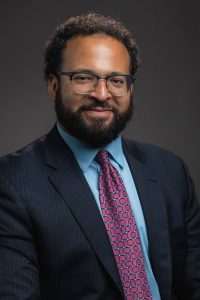Postdoctoral fellow Jelani Hannah, materials physicist and University of Chicago Ph.D. graduate, aims to blaze new trails at the U.S. Department of Energy’s Fermi National Accelerator Laboratory and push research forward through interdisciplinary collaboration.

Jelani Hannah aims to use his three-year JTFI fellowship to foster collaboration between teams of researchers. Photo: Ryan Postel, Fermilab
Hannah was awarded a Joint Task Force Initiative Postdoctoral Fellowship, offered by Fermilab and the University of Chicago. The fellowship aims to support innovative physics research by increasing diversity among early-career scientists, providing opportunities for up-and-coming academic leaders from groups underrepresented in science, engineering and computing.
“This is a great example of how the JTFI supports collaboration across the university and the national laboratories toward mission success,” said Juan de Pablo, University of Chicago executive vice president for science, innovation, national laboratories and global initiatives.
“The Joint Task Force Initiative Postdoctoral Fellowship presents an exceptional opportunity for early career researchers who are underrepresented in STEM to conduct new and innovative particle physics research at Fermilab,” said Sandra Charles, Fermilab’s chief equity, diversity, inclusion and accessibility officer. “We sincerely appreciate the support of the University of Chicago, which makes this fellowship possible.”
Hannah, a native of Chicago’s south side, was a graduate researcher at the University of Chicago when he learned about the fellowship. “It sparked my interest,” he said. “I have the background, and I like to do things where places have not been tread; I like to blaze trails. I wanted to solidify this and see what opportunities exist there.”
He applied for the JTFI fellowship in early 2023 and was offered the position in April of that year. He has been at Fermilab since June.
Throughout his post-undergraduate education, Hannah has studied experimental hard- and soft-matter physics. During his doctoral studies, he specialized in the fabrication and characterization of membranes, oxides and thin-film nanomaterials with former Ph.D. advisor Heinrich Jaeger.
“My specialty is making magic happen,” he said with a smile.
Hannah’s passion for physics started back in high school, where physics came naturally to him. “I was motivated to understand the nature of nature, and physics was the way to do that,” he said.
While at Fermilab, Hannah wants to connect with as many scientists as possible. During his first month at the laboratory, he shadowed a variety of research groups, including the Fermilab-hosted Superconducting Quantum Materials and Systems Center, the High-Power Targetry group and the Mu2e experiment. He picked the SQMS Center as the first group to work with.
“Since this is a three-year fellowship, my goal has been for me to not just work in one aspect,” he said. “This year, I hope to make the bridge to other groups here at Fermilab so that I can show one big circle of experimental physics research.”
Hannah cites his motivation to collaborate with a variety of scientists as a factor in completing his doctoral education.
“There is no ‘just one person’ to achieve a goal that can have an impact,” Hannah said. “Things must be done as a summation of individuals toward one common goal.”
Ten months into the 36-month JTFI program, Hannah thinks his time at the lab is off to a good start.
“On campus,” he said, “I really feel a community vibe here, which is what I’m about —collaboration and community.”
Fermi National Accelerator Laboratory is supported by the Office of Science of the U.S. Department of Energy. The Office of Science is the single largest supporter of basic research in the physical sciences in the United States and is working to address some of the most pressing challenges of our time. For more information, please visit science.energy.gov.
